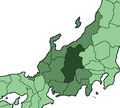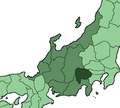Koshin-do — Koshin, also called Koshin nembutsu ko , is a folk faith with Chinese Taoist origins and Koshinto (ancient Shinto) influence, which became very popular in the Edo Era (1603 1867) and was absorbed into popular Buddhism. The oldest record about the … Wikipedia
Kōshin — Chūō kōchi (jap. 中央高地, dt. zentrales Hochland) bezeichnet den zentralen Teil der Region Chūbu in der Mitte der Hauptinsel Honshū von Japan. Allgemein wird Chūō kōchi auch Kōshin Region (甲信地方, Kōshin chihō) genannt und umfasst hauptsächlich die… … Deutsch Wikipedia
Kōshin'etsu region — is a subregion of the Chūbu region in Japan consisting of Yamanashi, Nagano and Niigata prefectures. It is the abbreviation of the old provinces, Kai, Shinano and Echigo provinces.This area is sometimes included into Kantō region and called Kanto … Wikipedia
Koshin — ISO 639 3 Code : kid ISO 639 2/B Code : ISO 639 2/T Code : ISO 639 1 Code : Scope : Individual Language Type : Living … Names of Languages ISO 639-3
Koshin Fujitani — is a Japanese politician of the Democratic Party of Japan, a member of the House of Councillors in the Diet (national legislature). A former member of the assembly of Yamaguchi Prefecture, he was elected to the House of Councillors for the first… … Wikipedia
Masatsukasa Kōshin — 将司昂親 Masatsukasa Kōshin Personal information Born Masahito Ono June 7, 1984 (1984 06 07) (age 27) Aomori, Japan … Wikipedia
Koshih — Koshin sama is a popular and powerful deity variously identified with the kami of agriculture (ta no kami), of soil (jigami), of travel (dosojin) and of craftsmanship. He is of Taoist origin, has a Buddhist identity as the gongen of the… … A Popular Dictionary of Shinto
Three wise monkeys — This article is about the pictorial maxim. For the Turkish film inspired by the maxim, see Three Monkeys. The three wise monkeys over the Tōshō gū shrine in Nikkō, Japan The Three Wise Monkeys (Japanese: 三 … Wikipedia
Mount Sukai — View on Mount Sukai from Mount Nokogiri. Elevation 2,144 m (7,034 ft) … Wikipedia
Totengericht — Das Totengericht oder besser Jenseitsgericht ist eine in vielen Religionen ausgebildete Vorstellung, die eindeutig nachweisbar erstmals in der ägyptischen Mythologie erschien und ein religiöses Konzept umschreibt, in dem der Mensch entweder… … Deutsch Wikipedia



